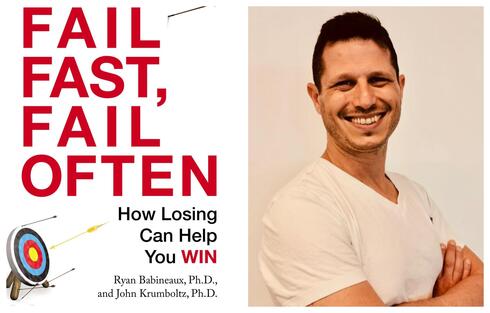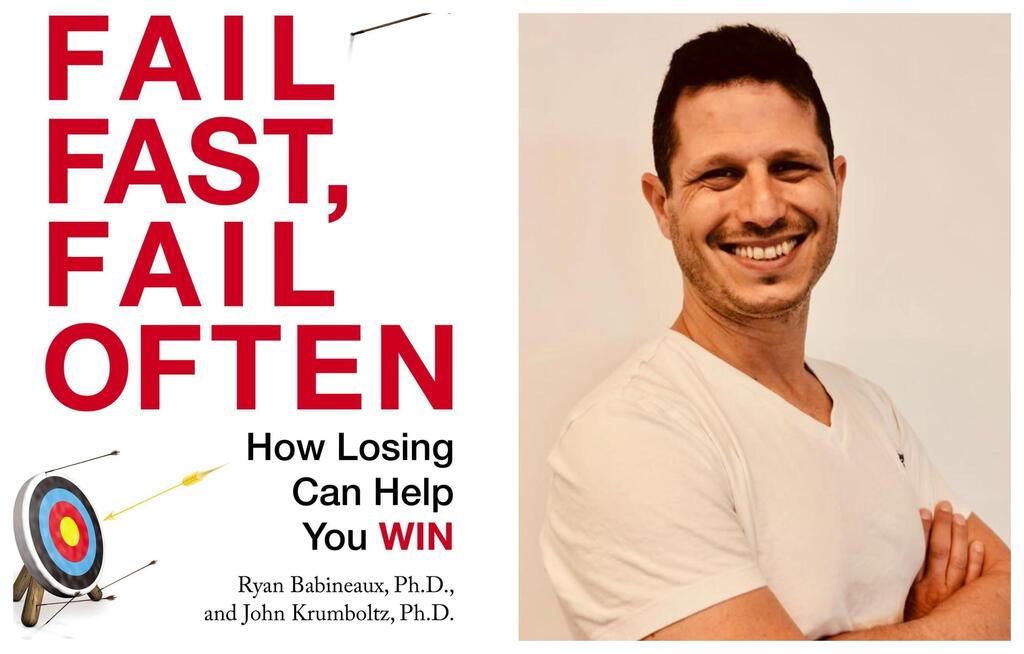
BiblioTech
CTech’s Book Review: Learning how to conquer your fear of failure
Ron Jaworski, CEO at Trinity Audio, shares insights after reading “Fail Fast, Fail Often: How Losing Can Help You Win” by Ryan Babineaux and John Krumboltz.
Ron Jaworski is the CEO of Trinity Audio, a platform that helps publishers and content creators build smart audio experiences for audiences. He has joined CTech to share a review of “Fail Fast, Fail Often: How Losing Can Help You Win” by Ryan Babineaux and John Krumboltz.
Title: “Fail Fast, Fail Often: How Losing Can Help You Win”
Author: Ryan Babineaux and John Krumboltz
Format: Book
Where: Home
Summary:
Based heavily on the authors’ research of the human condition and innovation, ‘Fail Fast, Fail Often’ is about acting instead of overthinking, doing instead of planning, and ultimately - conquering your fear of failure.
Through experiential and inspirational stories and advice, it portrays how successful and happy people move about their lives. They get out, try something new, and fail at it - but they also make the most of those experiences and opportunities by figuring out what works for them and what doesn’t.
The book shows why anyone, really, should let their enthusiasm guide them, be bold in their endeavors, and lean on their strengths whenever possible - especially if they are petrified of failing.
Important Themes:
Arguably the most important theme is that successful people are not afraid to make mistakes and fail here and there.
This is particularly relevant for entrepreneurs (and those who aspire to become their bosses) whose job description includes taking risks every so often. Some people stay away from entrepreneurship out of fear of failure, ultimately never achieving their full potential.
As psychologists and career counselors, Babineaux and Krumboltz explain in great detail why no one should be afraid of failure, how failing is an inseparable part of success, and why every successful entrepreneur failed more times than they succeeded.
The theme of failing early so you come out a winner in the long run might seem counterintuitive at first. However, the authors do a great job of presenting a path to success that’s made of mistakes - those you won't make in the future as each is a valuable lesson in itself.
If anything, the central theme of the book is about failing to take action and what you actually lose by doing so. Taking a little bit of risk and absorbing as much as possible from the inevitable failures along the way leads to not only a more rewarding career but life too.
What I’ve Learned:
I’ve read ‘Fail Fast, Fail Often’ twice. The first time I read it, it was a total mind opener as it explained to me in no uncertain terms why I should fail, as much as it sounds frightening.
It showed me the danger of overthinking and overanalyzing.
Entrepreneurs don’t have the luxury to question every poor decision we made, whatever it may be. More often than not, it leads to making excuses, something we absolutely can’t afford to have in this line of work. Life is too short to contemplate ‘what if?’.
As an entrepreneur, you don’t have the privilege of fear nor the luxury to allow other people’s definitions of success or failure to constrain us. We thrive on challenges and problem-solving, the freedom to do things our way. It’s the best part of being an entrepreneur but it also means failures will happen. The book makes it very clear and accepting, removing the paralyzing fear of doing something wrong.
On my second reading, I gained a decent sense of how I should fail, for the most part.
The objective is to do as much as possible in the smallest amount of time to get to the next opportunity. As a result, I’ve fully embraced the ‘fail fast’ concept, particularly if it’s an online business. Failing fast allows you to reach the desired result quicker than taking your sweet time to perfect the solution you’re selling, which, I feel, is the perfect methodology for a business in today’s digital age.
I had some semblance that success isn’t attainable without failure, but ‘Fail Fast, Fail Often’ really opened my eyes to the benefits of taking strategic risks often necessary for success.
Critiques:
If there is an aspect where the book somewhat falls short, it’s the lack of framework for failing fast.
Everybody needs a little bit of structure in their life so that everything can ultimately fall into place, and this book lacks it for the ‘how’ part of failing. It correctly identifies the problem but seems to, at times, overly focus on just getting going and doing things. There are plenty of examples of stories that address the ‘why’ side so you have to use your imagination to translate to your circumstances some of the advice given, then apply it.
Who Should Read This Book:
While I’d argue this is primarily intended for entrepreneurs and risk-takers, the truth is that ‘Fail Fast, Fail Often’ has a universal appeal on how to take your life to the next level. Whether you’re an early founder or an aspiring business owner, this book will crack the shell of the most reluctant of us to embrace failures and move to seize life’s pursuits in whatever shape and form they come.















